#JJK 238
Text
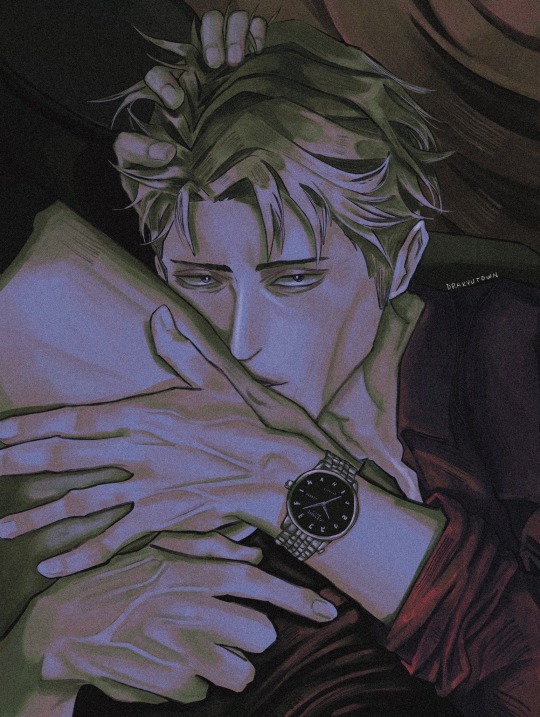
nanami's obsession
#thats my body right there#uh huh#jjk#jujutsu kaisen#fanart#digital art#jjk 237#jjk236#jjk 238#nanami#nanami kento#jjk nanami#nanami fanart#jujutsu kaisen nanami
5K notes
·
View notes
Text

perfection
#ryomen sukuna#jjk#jujutsu kaisen#artists on tumblr#my art#jjk 238#yes i started this when jjk 238 came out and only Just finished it#its been like 7 chapters since. lol#idk man kashimo gay as hell
1K notes
·
View notes
Text
twitter's reactions to jjk 238;
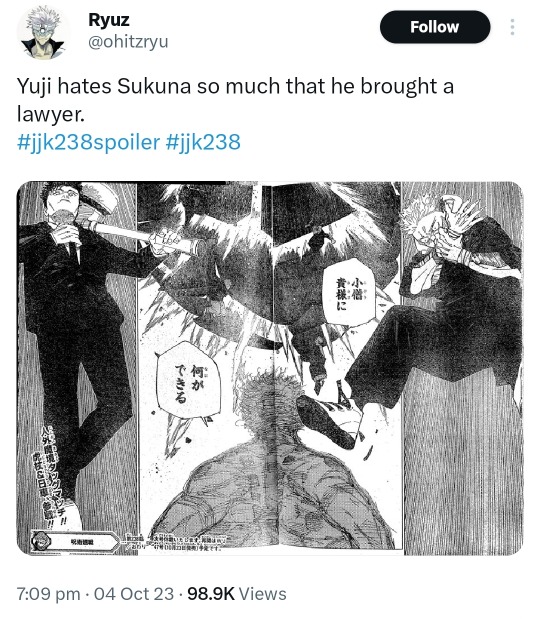
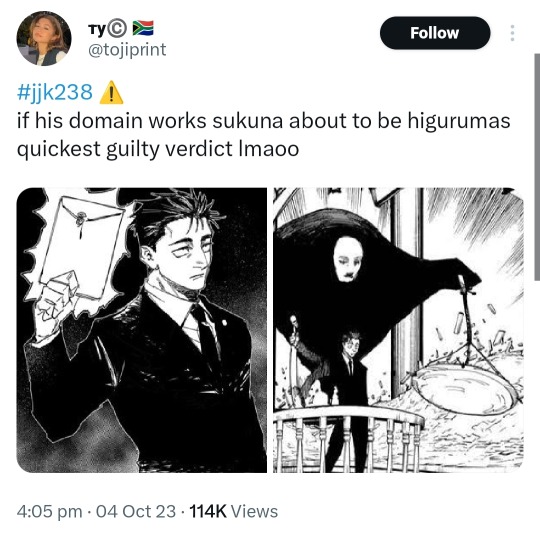
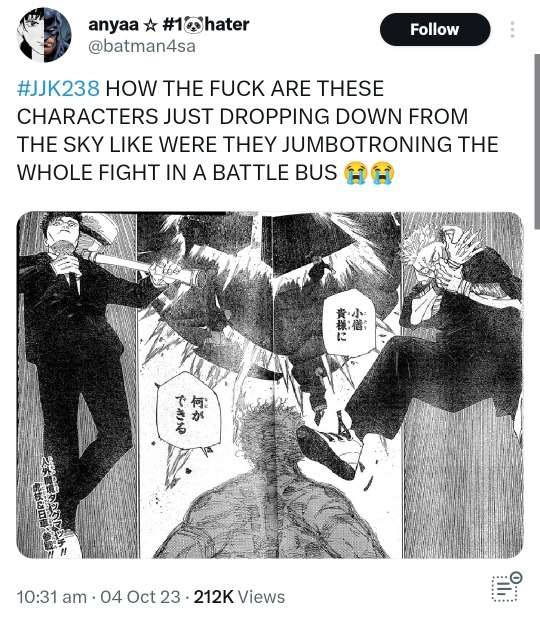



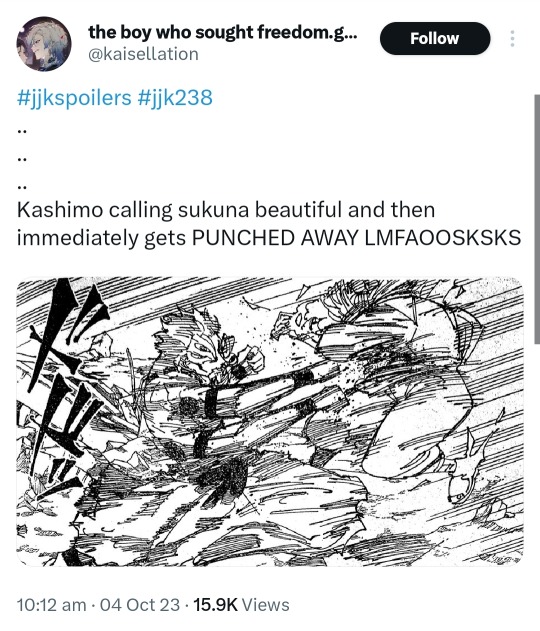

#jujutsu kaisen#jjk#gojo satoru#jjk fandom#jujutsu kaisen manga#ryomen sukuna#hajime kashimo#higuruma hiromi#jjk higuruma#yuji itadori#mahito#jjk manga#jjk manga spoilers#jjk 238#jjk tweets#jjk gojo#megumi fushiguro#jjk leaks
2K notes
·
View notes
Text
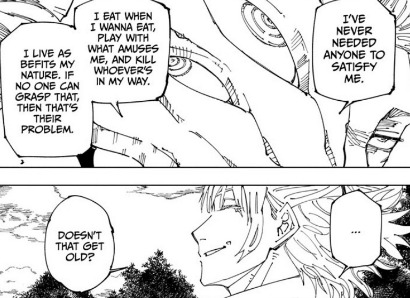
Sukuna's Anti-Enlightenment
Sukuna's words in this chapter practically mirror Mahito's words to Junpei from much earlier in the series.
"Do you understand? Life has no weight or particular value. Just like how water flows through the earth, life simply flows. For you, me and everyone else - it's the same. Without meaning. Without value. That's why you can do whatever you want. Live the way you want. Don't limit yourself to just being indifferent. There's no reason to live by such a restricting philosophy. If you're hungry, eat. If you hate, kill."
Both of these characters are rejecting humanity's natural instinct to look for a purpose in life and are instead subscribing to a more animalistic way of living following their basic instincts, if you're hungry eat, if you hate, kill. While the philosophy sounds simple enough there's something much more complex going on under the surface that requires digging deeper into Sukuna's mindset.
A True Curse
By having Sukuna essentially quote Mahito, the story is inviting us to compare them. A literary foil is a character whose purpose is to accentuate or draw attention to the qualities of another character. This term comes from an old technique of placing a thin metal sheet, or foil, behind a gem to make it shine. Sukuna is a character defined by how little both the other characters in story, and the audience understand him, something Yorozu comments on he's simply too powerful and isolated to be understood by the rest of humanity and so he stands alone. Which is why giving him a foil is a way to help the audience understand Sukuna without the author tipping their hand and ruining Sukuna's mystique. The question is what does Mahito highlight about Sukuna, and my answer is Sukuna is what Mahito wishes to be.... a True Curse.
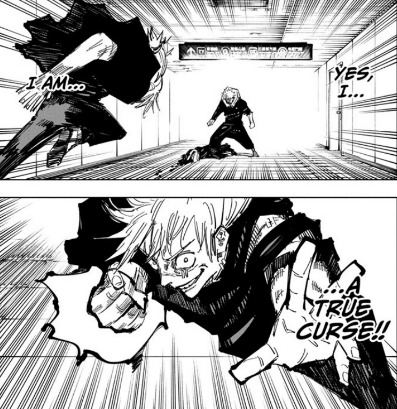
Mahito is many things, but without making this entire meta about Mahito his primary goal along with the rest of the special class curses is to eradicate humanity and replace them as the true humans. They basically want to destroy what humans have created and create a world of curses in their place.
Mahito is the most human like of the curse family, he reads human books watches human movies, even spends time getting to know a few humans personally and he also rejects them the strongest because he is made up of the human fear of other humans. Mahito is the one who reflects humans the most because all the other curses are made up on natural disasters, and yet he wants to destroy everything that's human inside of him and embody a true curse instead.
Which he does in the final phase of his fight against Yuji by literally ripping off his own skin like it's a chrysallis so he can emerge in a more curse-like form. Mahito is like the frankenstein's monster of the human id, he is created by the absolute worst impulses of humanit yand therefore rejects humans implicitly.
He even argues with his fellow curses that they shouldn't act too much like humans. Whend Choso, Jogo and Mahito disagree about whether or not they should revive Sukuna, Mahito argues they've been following Kenjaku's strategy too closely and they should make a game out of it and follow their whims or desires like a curse would isntead of using strategy like Kenjaku.
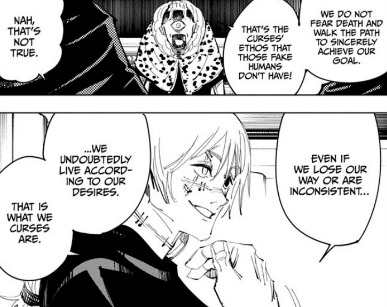
Mahito's idea of a curse is a creature of the natural world that lives entirely true to its own desires and hunger, satiating it without thinking about the effects their actions have on other people. A lion doesn't stop to ponder whether or not the gazelles its grazing on have feelings. A curse rejects the human need to fight purpose in life, or find deeper meaning or reasons behind their actions and only follow their instincts.
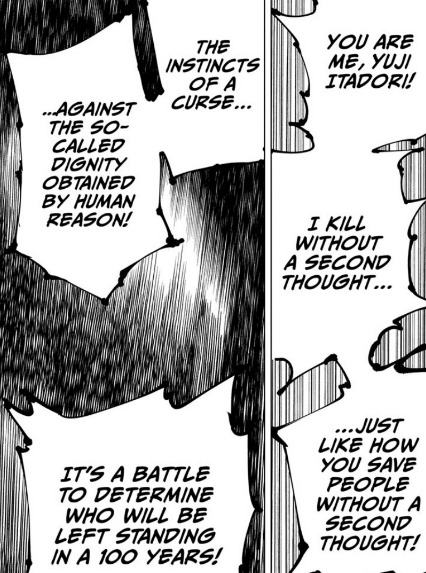
Mahito doesn't just not think about the meaning of life, he actively rejects there being any other meaning besides living to satiate one's needs. Remember Mahito and Sukuna both laugh together at Yuji, and Yuji identifies them as true curses as well.
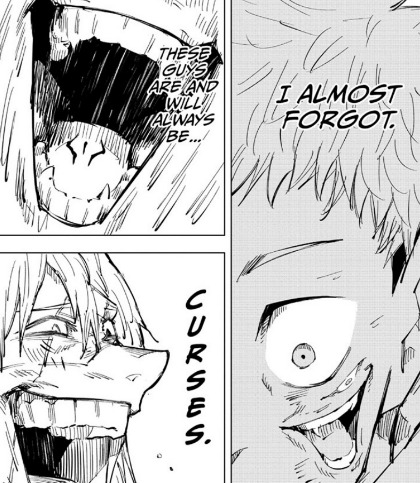
A scene which is called back to later on in the series shortly after Sukuna takes over Megumi's body.

In a series where even characters like Gojo and Kashimo who view other people as not human in the same way they are will have an aching loneliness and a desire to connect to others, Sukuna and Mahito both seem completely devoid of any humanity whatsoever.
Mahito however, is a baby and a newly formed curse while Sukuna is an adult that's existed for 1,000 years as the pinnacle of Jujutsu. Mahito is essentially the larval form of Sukuna in the story. Quite literally in fact, because he emerged from the chrysallis by ripping his skin off to reveal his true curse form in his final bout with Yuji. Sukuna is what Mahito wants to be when he grows up. Mahito talks the talk, but Sukuna is actually able to walk the walk.
It's a bit like how Gojo, Naoya, and Toji all sort of believe that power makes it so they exist in a different category of people, however Gojo and Toji have the ability to back that belief up with power whereas Naoya just gets his butt kicked a lot. Naoya even crosses the boundary line between human and curse in an attempt to reach the same level that Gojo and Toji were at.
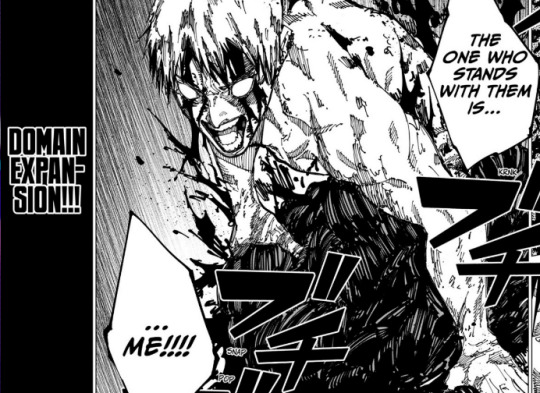
There's a pattern in the series of characters pushing themselves further and further away from humanity becoming curses and rejecting human values of meaning alongside of it. Going from higher thinking like empathy, philosophy, the search for meaning to lower, more animalistic and instinct heavy thinking. Naoya even says that becoming a curse reminds him of his childhood again like he's completely regressed intellectually.
Naoya: This sort of takes me back. There are things that children can't do that are easy for adults. After you grow up, you can't even remember the time you couldn't do it. Well, this is like that.
Jogo also defines a curse as someone who's true to their feelings, unlike humans who hide behind lies and pretend to be something they're not. All of this to say I don't think Mahito and Sukuna's views are nihilistic per se. Nihilism is rejecting that there is inherent meaning to anything in life yes, but in order to reject meaning you have to question it first. Mahito and Sukuna seem to be rejecting philosophy itself, an anti-philosophy philosophy so to speak. Nietzsche considered animals to be un-historic, because they only existed in the presence and have no history. They are, themselves at every instant because they only know of the now.
“Consider the cattle, grazing as they pass you by. They do not know what is meant by yesterday or today, they leap about, eat, rest, digest, leap about again, and so from morn till night and from day to day, fettered to the moment and its pleasure or displeasure, and thus neither melancholy nor bored. [...] A human being may well ask an animal: 'Why do you not speak to me of your happiness but only stand and gaze at me?' The animal would like to answer, and say, 'The reason is I always forget what I was going to say' - but then he forgot this answer too, and stayed silent.”
Cows aren't nihilistic, they're not anything because they just exist. They just exist as individuals in an eternal moment. They just exist.
Mahito: "Emotions come from the soul. It's too simplistic to call it "heart". People overthink things they can't see. I can see the soul so for me it's nothing special. It's practically the same as the human body. It just exists."
Mahito similiarly says that the soul just exists, there's no need to overthink the meaning of it or try to classify the soul as a "heart" capable of feeling emotions because it's just there. Sukuna similiarly doesn't worry about the past or the present, all humans are just momentary distractions to him and he only lives in pursuit of finding his next meal.
They just eat to satisfy their hunger temporarily, not because they find the food delicious or for any other reason. They're just living in pursuit of their next meal. It reminds me of a passage from my favorite existentialist book series Zaregoto.
"They say food, sleep and sex are the three basic desires of makind. But why are we eating this meal right now?"
"To ingest vitamins."
"Yes. Without vitamins, people die. And thus eating food brings pleasure. Sleeping feels good too, and sex, well, that's obvious. Anything that you hvae to do to stay alive always comes with pleasure."
[...]
"Now let's imagine someone who's obsessed with eating. In other words someone who eats not simply to take in vitamins, but because he's mad for the sensation of eating itself; for the beauty in the very act. The stimulation of his taste buds. The pleasure of feeling the food pass through his mouth. The joy of mastication. The ecstasy of feeling that mushed-up gook flowing down his throat. The feeling of fullness nearly destroying his satiety center altogether. The euphoia taking over his brain. To a guy like that, vitamins or lacktherof are totally irrelevant. The means and end have switched places for him, so now his main goal is something subsidiary. Now there's your problem. Can you still say this is eating? No, don't answer. You and I both know the only possible answer is no. WHat this guy is doing isn't eat. He's just eating the concept of eating."
Sukuna isn't even eating at this point, he's eating the concept of eating. He's eating because the pleasurable sensation of eating distracts him for a little while, and because looking for his next meal gives him something to do while he's killing time before he dies.
2. Anti-Philosophy Philosophy
They're not even saying that life is meaningless, because that's a conclusion you come to after questioning the meaning of life. They reject the questioning of meaning itself, the attempt to understand either life or other people. They're living entirely like lions prowling the sarangetti for their next meal.

"I've never needed anyone to satisfy me. I eat when I wanna eat, play with what amuses me, and kill whoever's in my way. I live as befits my nature. If no one can grasp that, it's their problem."
Mahito rejects the heart, Sukuna rejects love, both of these things are more complicated human desires than just eat until your stomach is full and kill or be killed.
Sukuna and Gojo both say "Tenjou, Tenge Yuigadoksun - above heaven, under heaven, I alone am worthy of honor" but only Sukuna goes on further to say "all that exists is my pleasure and displeasure". Even Gojo wants to be understood by others even if he thinks that normal people can't understand him and he exists as a different species from them, but Sukuna himself even rejects the fact people might understand him. They do, or they don't, it doesn't matter to him because he only needs to udnerstand himself. Sukuna's practically lapsing into solopism here.
Solopism is the philosophical lens that only one's mind is sure to exist. Knowledge outside of one's own mind is unsure, the external worlds and other minds cannot be known and might not exist outside the mind.
Solopism builds on the failure of Descartes maxim "I think; therefore I exist" which fails to provide any real details about the nature of the "I" that has proven to exist. Solipism asserts the only thing certain is the "I" - one's most certain knowledge is one's own mind, my thoughts, my experiences, my emotions. There is no link between the occurence of a certain conscious experience or mentals tates and the "possession" or behavioral dispoistions of a "body" of a particular kind. The experience of a given personality is private and only understood by that person. The solipistic view of Sukuna is that his experience in the present, what he's feeling, is the only thing that matters and everything else may as well not exist.
I'd only say it has things in common with solipism though, because even Solipism questions reality which Sukuna doesn't question anything. Suuna doesn't feel the need to question things or grow because in his mind his understanding of himself is perfect and complete which is why he doesn't need anyone else's comprehension of him.
In freudian psychoanalytic theory you could align Sukuna's behavior to the ID (I Desire). Jung and Freud both believe in a divded consciousness, but Freud divides it into three, the id, the ego and the superego. The id is the insintcts, superego is the higher thinking like morality, and the ego is the mediator between the two. The id is the most primitive and instinctual part of the mind. For example a child is said to be all id, because they don't understand rules or other people's feelings they only want to fill their basic needs. Mahito would be the childlike aspect of the id, because he is a newborn fledgling cursed spirit.
The id also follows the pleasure principle, which Sukuna's philosophy also follows "all that exists is my pelasure and displeasure." Freud argues the pleasure principal is an ingained survival instinct "what decides the purpose of life is simply the programme of the pleasure principle". The Id is made up of the life-sustaining activities such as eating and sex, and it makes these things pleasurable so we will pursue them. However, there's also a counterpart to the pleasure principle in the human psyche that is the reality prinicple, which is the human capacity of defer gratification of a desire when a situation doesn't allow you to have immediately what you want. The id is ruled by the pleasure principle, and immediately wants all of its desires granted at the cost of everything else, but mature human egos are able to delay instant gratification for a higher objective.
Sukuna basically lives by the rule of the pleasure principle. He's shown capable of long term planning if he needs to like taking Megumi's body, so he's not incable of delaying instant gratifciation but at the same time his ruling princple seems to be seeking immediate pleasure. Sukuna is a walking appetite, he literally has a mouth on his stomach.
There's also the alchemical trinity to consider, mind, body, and soul. In this Sukuna is the body. Not only is he a body hijacker who has literally transformed Megumi's body practically into his own, but he also only lives to satiate the phyiscal needs of the body.
This is where Sukuna would differentiate himself from solipism though, because he needs to exist in a physical body. His entire quest over the course of the manga is to regain a body, he needs to eat, he needs to fight physically, he wouldn't be comfortable just existing as a brain within a jar he needs to stay in the physical world. He lives for the physical pleasures of this world.
What about the Body character? There isn’t one in every alchemy story, but when this does appear, the markers are predictable. Body characters are focused on their bodily needs--they are hungry, thirsty, and, in adult stories, lusty. And they are often fearful. Think of Papageno in Mozart’s opera, the Magic Flute, who breaks his vow of temperance and starts eating and drinking on stage, lamenting his lack of female companionship. Or Wiggins in The Little White Horse (he’s a beautiful, vain King Charles spaniel, always focused on his next meal). Or Sméagol/Gollum, who eats compulsively though his main lust is for the Ring.
Sukuna for instance wouldn't be happy living like Tengen who exists far outside of humanity simply observing others, because he has a need to interact with the world in the form of eating, or experiencing earthly pleasure.
In fact after going through several philosophies which don't quite describe Sukuna's own philosophy (because it resembles these while inherently rejecting the need for philosophy) we might come to the closest comparison for what Sukuna's desire is, which is to exist for as long as possible on the earthly plain while filling up his stomach.
Sukuna is comparable to the Celestial Demon Mara in budhist mythology, more on it in this thread. In budhist cosmology, Mara is the "personification of the forces antagonistic to enlightenment."
Devaputra-mara specifically is the deva of the sensuous realm, who tries to prevent Gautuma Budha from attaining liberation fro m the cycle of rebirth the night of his enlightenment. The existence of Mara is to defy Budha, and specifically to prevent his escape from the cycle of the world, especially the sensuous realm. He exists in opposition to the three marks of existence too.
Number one impernanence, that all existence, without exception is "transient, evanescent, inconstant".
Number two Dukha "Suffering, pain, unsatisfactoriness" is inherent to life.
Number three antaa "Non-self, non-soul, no-essence."
If the ultimate goal of budhism is to escape the cycle entirely and stop being reborn in the sensuous realm, Maara instead tempts people to stay in this realm. it defines impernanence by suggesting we stay in this realm forever. It defies Dukha by saying we indulge in physical pleasures in this realm, that we should seek to satisfy ourselves even if budhism argues that life is primarily unsatisfactory. Then if the ultimate goal of existence in budhism is the "non-self" to escape ego, Maara argues we should remain trapped as ourselves forever.
We even see Sukuna literally tempt a budha-like figure into remaining in this earthly realm. After all aren't we shown that Gojo achieved enlightenment at seventeen and let go of earthly emotions like the need to be angry and avenge Riko's killer because the feeling of oneness with existence was too good in that moment.
A lot of people noticed what they thought was Gojo acting out of character in the fight with him and Sukuna, by enjoying the fight and choosing his selfish desire to love jujutsu and fight as a sorcerer over his responsibiltiy to protect children. Something which Nanami says in his dying hallucination that Gojo only ever lived for the pursuit of his selfish desire for Jujutsu in the first place.

Gojo, a character that we know has a higher minded ideal that he's fighting for the next generation of sorcerers is shown losing that ideal in the fight with Sukuna, and only caring about his earthly pleasures, having a satisfying fight against a strong opponent. You could even say that was Sukuna's goal in the fight, to strip off Gojo's fish scales so to speak and reduce him back to being a normal human being. Something which he accomplished when he managed to learn to cut the space that Gojo inhabited, therefore negating the infinitity that protected him and dragging him back to this earthly realm.
"This is goodbye. You were born in an era without me and hailed as the strongest yet you turned out to be painfully ordinary..."
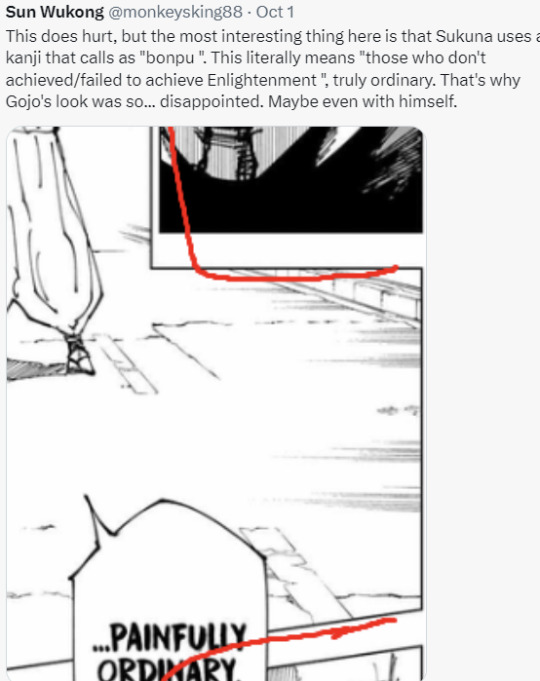
In a way Sukuna tempted Gojo away from enlightenment and succeeded. The linked thread goes on to say that Budha defeats Maara to save his students during his temptation, but Gojo on the other hand died and failed protecting his students specifically because he chose the earthly pleasure of seeking to have fun in a fight over the well-being of his student Megumi who's body was possessed.
He made a human being again out of an enlightened Gojo, and dragged him back to morality and the cycle of death and rebirth by making Gojo care more about his selfish desire for a fight than the principles he fought for. Sukuna trapped Gojo in the mortal realm along with him.
Sukuna's philosophy sounds like Mara's too, that rather than seeking anything better you should just distract yourself from the unhappiness of life by indulging in pleasures to stifle your misery.
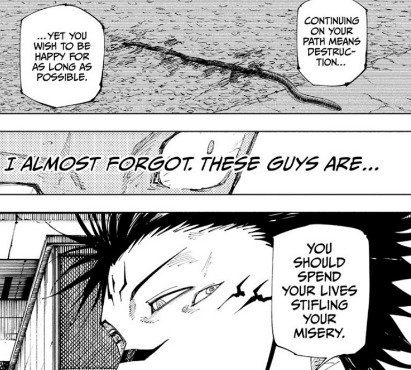
I'd say Sukuna lives the same way. He doesn't consider himself weak, but he doesn't talk about life or this world like it's a fun place to be. He tells Yuji to stifle his misery. He then admits to Kamo that his purpose in life is just to eat delicious things to kill time until he dies.

"Life is just killing time until you die" sounds like a miserable kind of hedonism, since he's only distracting himself from the unpleasantness of life. Sukuna too might just be spending his life stifling his own misery by seeking endless pleasure on earth. He doesn't want to escape earth however, he wants to remain on earth for as long as possible. Kamo even pointed out the strange contradiction in his own philosophy.
Sukuna insists he doesn't need to be understood by others, that he's not alone, that fighting and eating his way through life is enough for him because he understands himself and all life is just enertaining yourself until you die anyway, but Kamo asks why if he's just satisfied with that kind of life did he go to the trouble of ripping his soul into twenty pieces and trying to regain his body 1,000 years later.
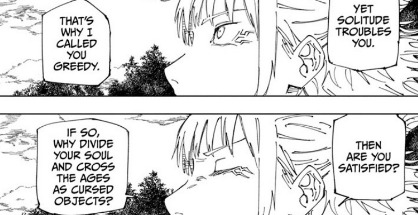
Sukuna notably avoids this question. He doesn't tell Kamo why he even bothered to divide his soul up and extend his life if he's perfectly satisfied with life as it is. We don't get the answer to why he wants to possess Megumi or is going through all this trouble.
That's where we get to the greatest snag in Sukuna's philosophy, which ironically relates back to the tug of war between the pleasure principal and the reality principal.
Sukuna's philosophy is that he's never needed anyone else "I've never needed anyone to satisfy me. I eat when I wanna eat, play with what amuses me and kill whoever's in my way. I live as befits my nature. If no one can grasp that, then that's their problem."
The big glaring flaw in Sukuna's philospohy that he's only ever needed himself is kind of like the flaw in the american "pull yourself up by your bootstraps philosophy" its that everyone including Sukuna needs other people. Sukuna isn't fighting with his own strength alone right now. He stole it from Megumi. He could have conceived of a way to beat Gojo without the Ten Shadows yes, but right now Sukuna wouldn't even be able to exist in the physical world without Megumi's body.
He is literally a parasite in a teen boy's body, using him to his own ends and yet he insists that he's the only one that exists or matters and he's always been able to accomplish everything he wanted with his own strength. Sukuna's a parasite right now, arguing that he's the greatest individual and has never needed or relied upon anyone.
The Great and Mighty Sukuna is defiling a young person's body for his own gain, the same way that Kenjaku defiles women and his own children, the same way that the elders manipulate the young in Jujutsu Kaisen to maintain their power base in Jujutsu Society. This supposedly all-powerful erson who only ever relies on himself and only needs his own ego wouldn't even be alive right now if he wasn't paraisitizing Megumi's body, yet he argues that he's completely fulfilled in himself.
A freudian perspective argues that a mature ego finds a balance between the pleasure principal (the need for instant gratification) and the reality principal (the ability to defer instant gratifiaction when the situation doesn't allow for it). Whereas a child is only ID and only cares about fulfilling their most basic needs first and foremost.
Sukuna is paradoxically presenting his views like he's a fully realized, enlightened adult the absolute peak of sorcery, the most developed and intelligent sorcerer in the world, etc. etc. yet he has the underdeveloped ego of a child because he has no grip of the reality principal. A person who doesn't interact with other people or the world, can't learn or grow from it. Which is probably why the closest character you can compare to Sukuna is Mahito, a literal child and a newborn curse. Even Mahito fails to become a true curse in the end.
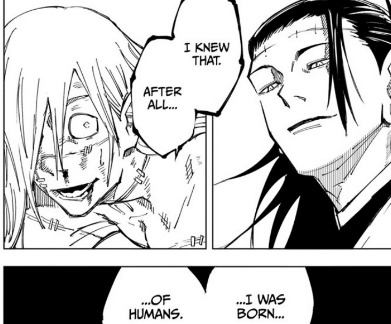
Sukuna says he rejects enlightenment, and any higher philosophy in order to remain in the earthly realm forever, but one wonders if that isn't the same as the Miltonian Lucifer rejecting heaven to reign in hell.
The mind is its own place, and in itself Can make a heav’n of hell, a hell of heav’n.
What matter where, if I be still the same, And what I should be, all but less than he Whom thunder hath made greater?
Here at least We shall be free: th’Almighty hath not built
Here for his envy, will not drive us hence: Here we may reign secure, and in my choice
To reign is worth ambition, though in hell; Better to reign in hell than serve in heav’n.
The theme of Paradise Lost is that any sinner, even Lucifer, can stop at any time and seek forgiveness instead. However, Lucifer chooses not to do that. He could leave hell at any time but he chooses to stay. He’s fine in hell after all. He’s totally gotten used to the temperature by now. Everything is fine Lucifer says, while everything is on fire.
Lucifer would rather stay in a hell of his own creation because it gives him the illusion of control over his life then admit he was wrong or give up that control.
He may be king of hell however, but he's still in hell. Hell is not exactly the most pleasant place to be. King he may be, but he's trapped here the same as everyone else.
Sukuna may be the closest a character has come to being a true curse, he might have transcended humanity, the human need for love, but he still can't escape the earthly realm. In fact his entire philosophy is a mara-esque avoid enlightenment and stay in the earthly realm as long as possible. In a series where characters like Yuki and Kenjaku are trying to evolve cursed energy into something different, either by completely removing it, or by optimizing it and forcing it to take a new form Sukuna is someone who is stagnant and resisting that evolution. Why would someone who's already perfect need to evolve in any way?
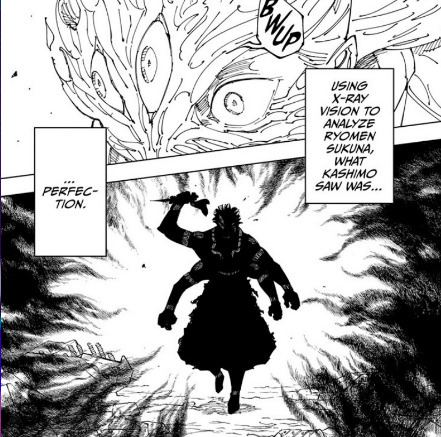
That might just be Sukuna's downfall in a way. By rejecting other people, by rejecting the human need to seek meaning in life, he may have made himself completely stagnant. After all if Sukuna already accepts everything about himself, if he is a fully realized individual then why would he need to change?
He can steal techniques and knowledge from others of course, but that's what he always has done. The real question is how would Sukuna who's the perfect sorcerer, who's never been anything other than a sorcerer and lives to be one, exist in a world where the definition of what a sorcerer even is will probably change by theend of the manga?
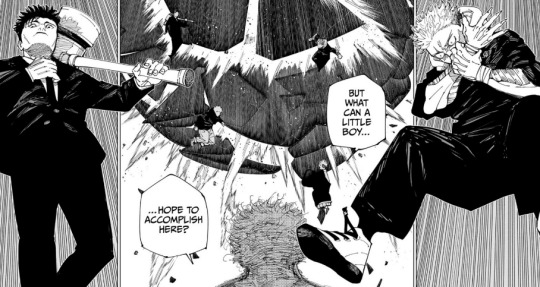
So Sukuna may ask "What can a little boy hope to accomplish here?" but a child like Yuji is capable of the one thing that Sukuna isn't, growing and changing into something better.
#jjk meta#ryomen sukuna#mahito#jujutsu kaisen#jjk 238#jujutsu kaisen 238#jjk spoilers#jjk 238 spoilers#jujutsu kaisen 238 spoilers#yuji itadori#itadori yuji#sukuna
585 notes
·
View notes
Text
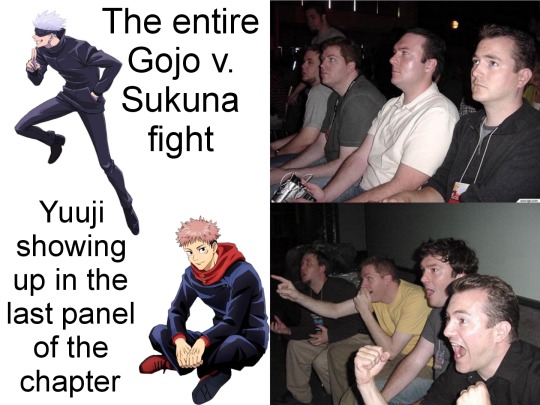
My priorities, if you even care.
#i liked the fight but everything after it is so much more interesting#jujutsu kaisen#jjk spoilers#jjk 238
553 notes
·
View notes
Text
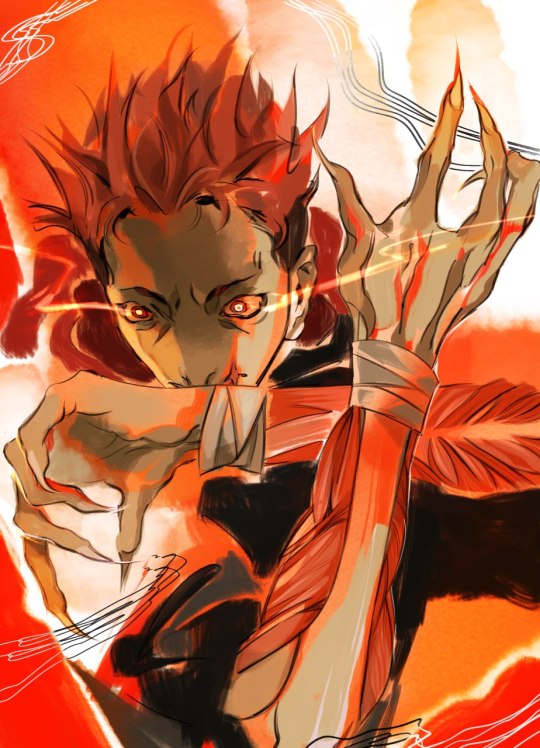
474 notes
·
View notes
Text
i need gege to fall in stupid love with someone bc this sukuna storyline is concerning, i need someone in gege’s life to change the trajectory of the story
#jjk#jjk 238#jjk leaks#jjk spoilers#sukuna#sukuna the sadboi edgelord#someone love him fr#it’s obvious he craves it
262 notes
·
View notes
Text
Someone on Instagram made an interesting point- Gojo and Sukuna treat Jogo differently.
Gojo said "It'll be fine. After all... you're weak." But Sukuna said "Be proud. You're strong."
Which is hilariously contradictory bc Sukuna is stronger than Gojo.
And someone else commented "That's the difference between 'born gifted' and 'made himself stronger'".
Sukuna didn't even give his all during their fight, although Gojo gave him his everything- from his physical strength to attempts at humor, because Sukuna allowed him to do so. And after all that, he said "You did well, I won't forget you as long as I live."
Sukuna is so keen on giving praise if the person actually deserved it. From Uraume, to Megumi, to Yorozu, to Kashimo, to whatever special grade curse. It's not beneath his honor to aknowledge someone weaker, in contrary to Gojo's constant bragging about being the strongest.
Gojo said "I will win" and yet, after he died, he told Suguru "I don't think I would've won even if he didn't have Megumi's Ten Shadows". He was lying and hyping himself up, but the truth is- he wasn't even sure if he was going to win. Plus they all made a backup plan for Kashimo jumping in first in case Gojo dies, so it was lowkey expected.
Like, Gojo is showing off with his fake bravado and "My students are watching" but Sukuna doesn't even need to show off or prove himself to anyone. He's 1000+ yo curse, he's too old for this. He already knows that he's stronger. And wiser. He experienced it all- from grace to blood, to arts, to war, to hatred, to love. Everything. And even though he knows what love is, he values respect more. That's why he's not going on a killing spree like some mindless animal. He's fighting with grace. In Gojo's words, "like a samurai".
And although he's the main antagonist, I can respect him.
284 notes
·
View notes
Text
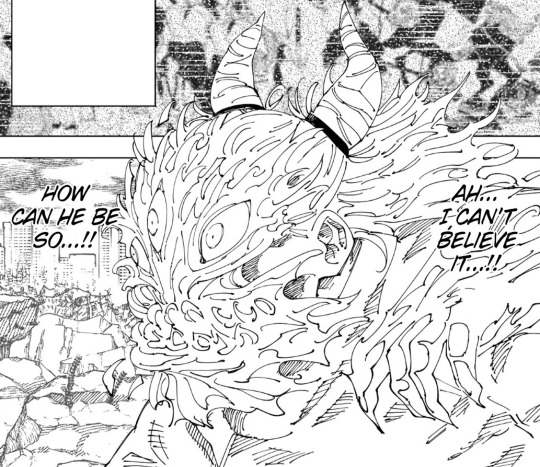
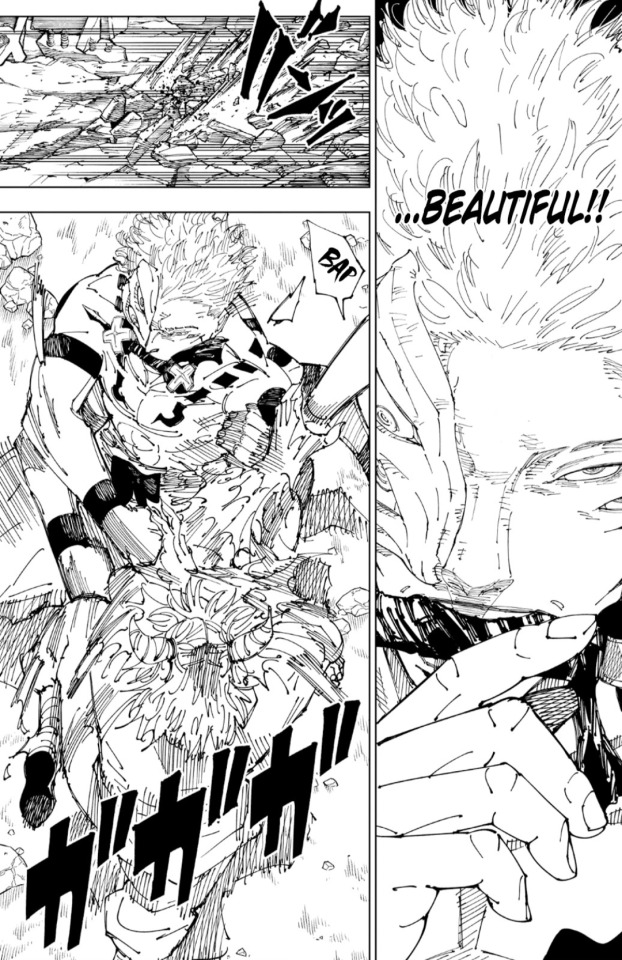
Kashimo being relatable af
#I COULDN'T WAIT TO SEE MORE OF TRUE FORM SUKUNA#monster fuckers unite#jjk#jjk spoilers#ryomen sukuna#jjk kashimo#kashimo#sukuna#true form sukuna#jujutsu kaisen#jujutsu kaisen spoilers#jjk sukuna#jjk 238#jjk ch 238#jjk chapter 238#jujutsu kaisen 238#hajime kashimo#guya posts
292 notes
·
View notes
Text
love the plot twist that Kashimo's the one who's horny for Sukuna, not Yorozu
#I mean she likes him for his strength and wants to own him (marry him)#all that was always more about her tho and the feelings she projected onto him she doesn't actually care what Sukuna looks like#meanwhile Kashimo is writing poems about Sukuna's beauty#jjk spoilers#jjk 238#jjk leaks#yorozu#kashimo hajime
198 notes
·
View notes
Text
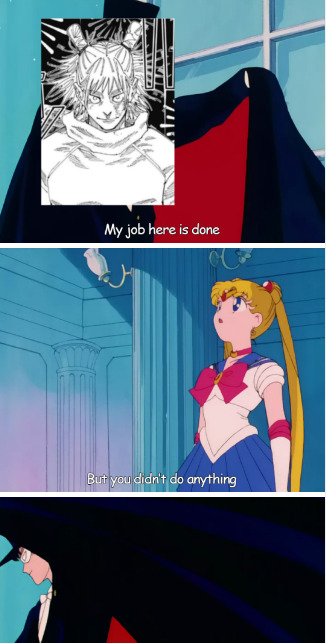
277 notes
·
View notes
Text
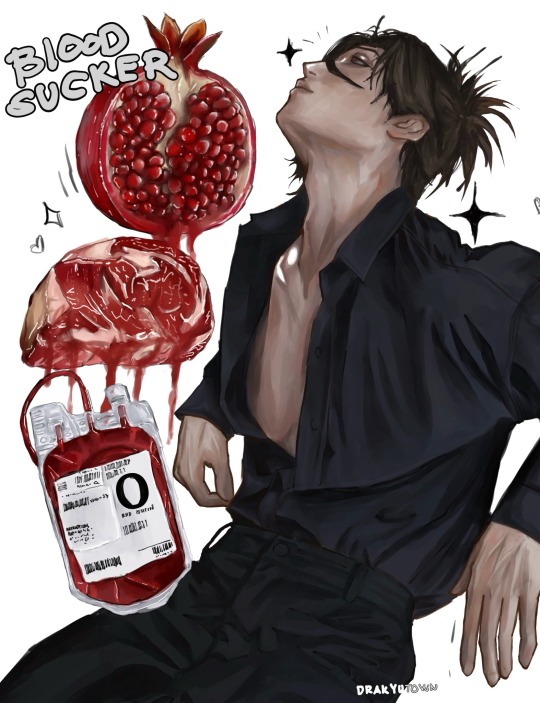
modern vampire!choso
#fanart#digital art#jjk#jujutsu kaisen#jjk 237#jjk236#jjk 238#choso#chosokamo#kamo choso#jjk choso#jjk fan art#jjk season 2#jujutsu choso#jujutsu kaisen choso
2K notes
·
View notes
Text
kashimo jumped in right after gojo died to deliver absolutely nothing

#is this bullshit what we traded in gojo getting mourned for ? really?#who the fuck is gege's editor hoooooolllyyyyy shiiitttttt this is so bad#jjk 238#jjk leaks#jjk spoilers
313 notes
·
View notes
Text
twitter's reactions to jjk 238;
(pt 1). (pt 3)


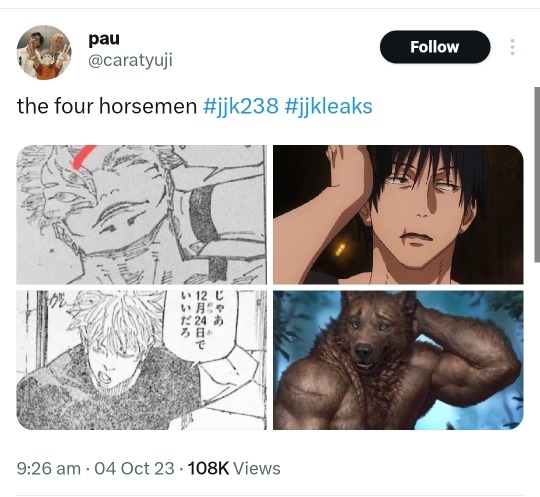

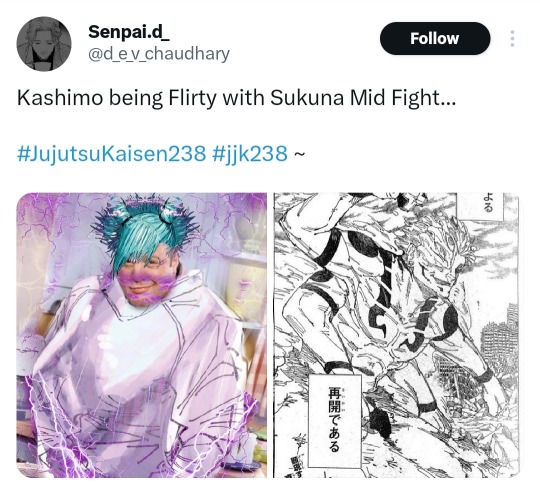

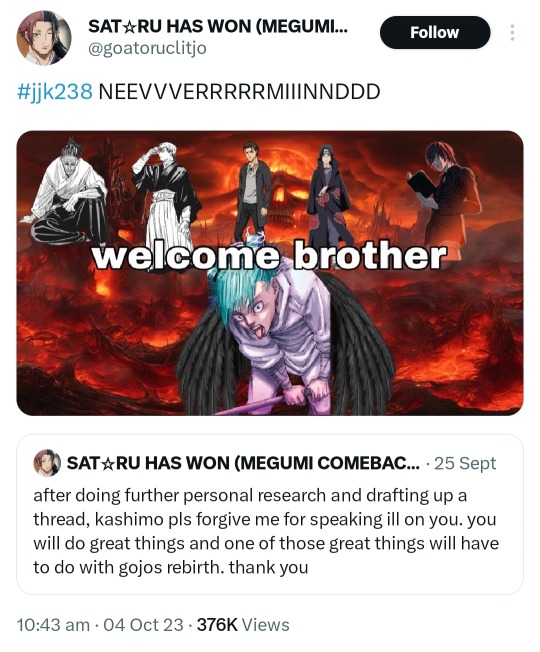
bonus!
#jujutsu kaisen#gojo satoru#jjk#jjk fandom#jujutsu kaisen manga#ryomen sukuna#jjk manga#jjk 238#higuruma hiromi#hajime kashimo#yuji itadori#toji fushiguro#yuta okkotsu#jjk memes#jjk tweets#hakari kinji#jjk uraume
2K notes
·
View notes
Text
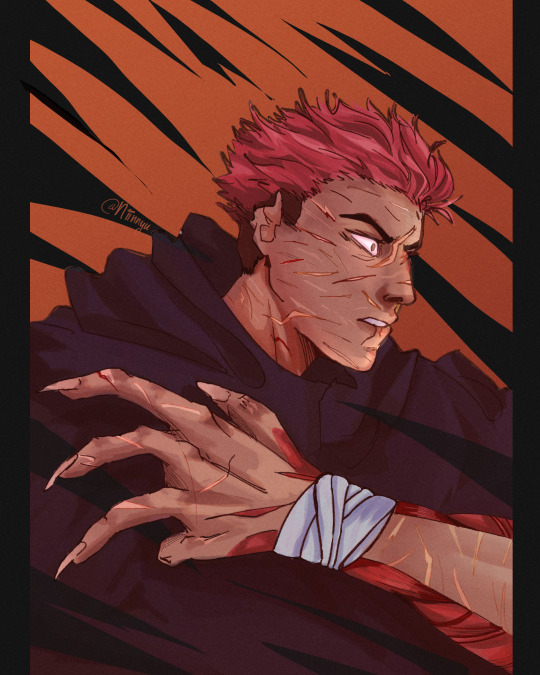
Bearing stripes and claws and fury.
The Tiger of West High is back beybey! Drew this with my non dominant hand?!? Ngl it's p good lol
Some other versions I liked too heh

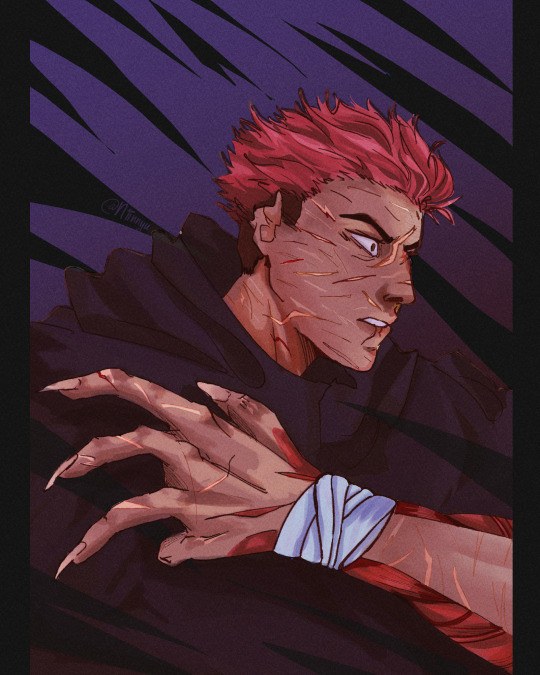
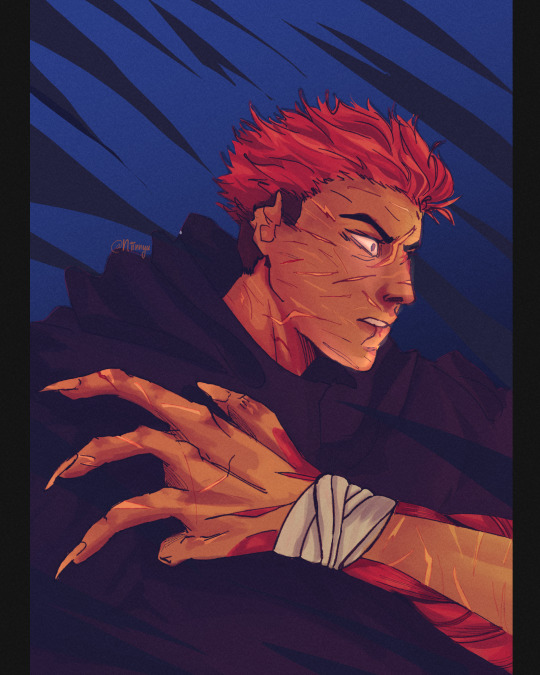
#IS THE BOOOYYYY!!!#since no chapter this week have this lol#im pretty excited to see yuuji in action again my boy has been sidelines for literally 2 years now#but it seems as though yuuji might have been busy chompin on some cursed stuff in the mea time hmmmm#anyway#excited to see higuruma too hope he stays#itadori yuuji#itadori yuji#jujutsu kaisen#jjk#jjk fanart#jujutsu kaisen fanart#jjk manga#jjk manga spoilers#jjk spoilers#jjk 238#sukuna#digital art#tiger of west high school#hehehe#maybe i should switch hands more often#lolol#niinnyu arts
275 notes
·
View notes
Text
I love that Sukuna just can't let Yuuji have a win ever. He'll compliment anyone else, but Yuuji. He was happy to see others join the fight, but as soon as he spotted Yuuji, it was, "What tf are you gonna do? Why are you even here??"
#sukuna's such a fucking hater and its so funny#i hope yuuji kicks his ass#jujutsu kaisen#jjk spoilers#jjk 238#ryomen sukuna#itadori yuuji
415 notes
·
View notes